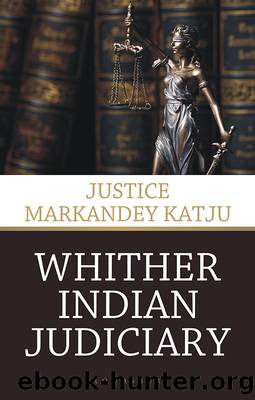Whither Indian Judiciary by Justice Markandey Katju;

Author:Justice Markandey Katju;
Language: eng
Format: epub
Publisher: Bloomsbury UK
Part VI
Whither Indian Judiciary/From the Labyrinth of Memory Lanes
Chapter 21
THE JUDICIAL FUNCTION IS A SOVEREIGN FUNCTION
History has the quintessential fault for being the cauldron of simmering wisdom wherein you stir and stir to bring out the taste of words that impart the mind with its requisite precedents. As such in 1991, when I became Judge of the Allahabad High Court, I took recourse to the lessons offered by the precedents of history to dispense my duties diligently. Although, I was new to the job of being a judge, I had an extensive experience in the judiciary system and I was well acquainted with the incalculable challenges that adorned my way ahead. I also felt the need to be counselled over the discretions of the role of a judge and therefore, to that effect, I directed myself to seek the timeless wisdom contained in the Shanti Parva of the Mahabharata.
When the war of the Mahabharata was over, Bheeshma Pitamah, the eldest among the Kaurava warriors, remained stretched out on the harrowing bed of arrows. Lord Krishna told Yudhishthira that he was to take charge of the throne and become the King as the Kauravas had been defeated. So, it was essential that he learnt statecraft (raj dharma) and Lord Krishna advised him aptly that the best person to teach him about statecraft was none other than Bheeshma Pitamah, who was giving up his body in due time. Therefore, the Lord entreated him to take the opportunity to learn from Bheeshma Pitamah about the virtues of a king.
On Lord Krishnaâs recommendation, Yudhishthira went to Bheeshma Pitamah and after paying obeisance to him, he ensued on asking his questions about how a king should ideally conduct himself. The inquisitive Yudhishthira asked him question after question to which Bheeshma Pitamah satisfied the prospective king with all the answers. Thus, the riveting Shanti Parva narrates the exchange of questions and answers between the two.
The instructions of Bheeshma Pitamah to Yudhishthira were contained in this shloka:
âMridur hi raja satatamlanghyobhavatisarvashah
Teekshrnyaat cha udvijatelokah, tasmaatubhayamaashrayaâ
ie
âIf the King is always lenient, nobody pays heed to his orders;
And if he is always harsh, the people become terrorised.
Therefore, a King should sometimes be lenient and sometimes, harsh. (Depending on the circumstances)â
Bheeshma Pitamah said the same thing in another shloka of the Shanti Parva:
âTasmaatnaivamridurnityamteekshnonaivabhavetnripah
Vaasantarkaivashrimannasheetona cha dharmadahâ
ie
âJust as in the springtime (vasant ritu), the Sun makes the weather neither too cold nor too hot, so also the King should neither be too harsh nor too lenient.â
Bheeshma Pitamah also counselled that:
âThe King should not always forgive, for then the wicked people shall regard him as weak and ignore him.
The King should take care of the people who cannot take care of themselves such as the old and the infirm, and punish the wicked.
O Yudhishthira, I know that by nature you are forgiving and merciful, but the state cannot be governed in this manner. By always forgiving and being merciful, you will be regarded as a coward by the people and not given respect.
O Yudhishthira, you
Download
This site does not store any files on its server. We only index and link to content provided by other sites. Please contact the content providers to delete copyright contents if any and email us, we'll remove relevant links or contents immediately.
Killers of the Flower Moon by David Grann(3235)
Machine Learning at Scale with H2O by Gregory Keys | David Whiting(2287)
Will by Will Smith(2041)
Guns, Germs and Steel by Diamond Jared(1882)
Borders by unknow(1785)
The Room Where It Happened by John Bolton;(1720)
The Color of Law by Richard Rothstein(1574)
Once Upon a Broken Heart by Stephanie Garber(1482)
Water Rights and the Environment in the United States by John Burch(1414)
Friends, Lovers, and the Big Terrible Thing by Matthew Perry(1327)
Examples & Explanations: Administrative Law by William F. Funk & Richard H. Seamon(1325)
A Short History of War by Jeremy Black(1299)
HBR's 10 Must Reads 2022 by Harvard Business Review(1255)
Pharmacy Practice and The Law by Richard Abood(1253)
The Strength In Our Scars by Bianca Sparacino(1244)
That Every Man Be Armed by Stephen P. Halbrook(1236)
The Guarded Gate by Daniel Okrent(1219)
515945210 by Unknown(1207)
Injustices by Ian Millhiser(1198)
